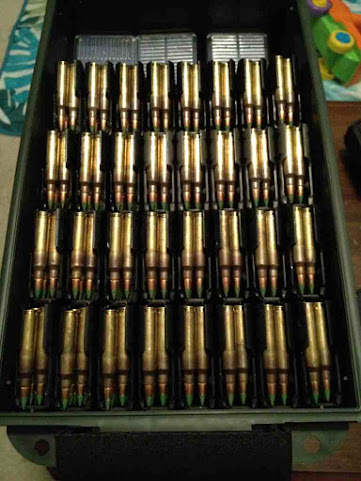Updated Ammo Considerations: Base, LBE, and SHTF Load Out
Repost from the 'nuked' blog, originally posted in '18, updated to today's environment.
Just
received a question on whether or not I still believed the minimum amount of
ammo held in reserve (meaning, never used for anything but SHTF, and when
choosing to rotate, new stock is put in before
old stock is removed) for each rifle and pistol owned should be 1000 and 500,
respectively. Short answer: ABSOLUTELY!
DTG
has always recommended the absolute minimum is to have 1,000 rounds per
rifle and 500 rounds per pistol owned in reserve, which does
not count that which you use to keep your skills honed, which should be about
750 to 1,000 rounds per year with your rifle, and 500 to 750 rounds per year on
your pistol.
You
might also throw into the equation replacement magazines. We’ve always recommended an absolute minimum
of seven magazines (7.62NATO will most likely be 20’s/5.56NATO, 30’s) for your
SHTF preparation per rifle; three magazines per pistol. Dead minimum.
That number doesn’t take into account any you might load for your
ruck/resupply, etc. More on that, later.
Here’s
an Example:
M-4gery’s owned: 2
Ammo in
Reserve: 2,000 rounds (1K for each
m4gery)
Ammo for annual
training*: 1,500 – 2,000 rounds (presumes 2 shooters – if one M4gery is a spare,
you could cut this number in half, but then again, why not simply switch out
the ‘4geries and get in more trigger time?)
Total Ammo owned
now: 3,500 – 4,000 rounds
Pistols owned: 2
Ammo in
Reserve: 1,000 rounds (defense ammo, not
FMJ (500 per pistol)
Ammo for annual
training: 1000 – 1500 rounds (see above – presumes 2 shooters)
M4gery mags: 7 per M4gery
Pistol mags: 3 per
pistol
*These days, having a CMMG .22LR adapter for the AR is a sound training strategy, especially if you're stretching out your existing supply of 5.56NATO. It really helps. Trust me on this Palmetto State Armory has them for $199 and it comes with 3 mags - cheapest I've seen them since Chicom flu.
While it might
seem like a lot, it’s really not, unless you’re buying all of this at
once. If you’re just starting out, get
it incrementally (check daily for, 'flash sales'). Take a year to get
your minimums up to par, and then every year, do the same and add to your
reserve. It’ll seem easier the 2nd
year, because you’ll most likely have adapted your budget to include these
essential items. If you’re worried about
shelf life, don’t. There is NO shelf
life on ammo. I have some WWII M2 Ball
(30-06) that still pops, and pops well! (The only thing to remember about older ammo such as the M2 Ball is that
it is corrosive, and when you shoot it, you need to clean your weapon
thoroughly after the range, especially the gas system (if it has one).
Storage - All you
need do to ensure you’re ammo will last in storage is keep it in a reasonably
consistent cool temperature storage area and dry. Something else you might do is refrain from
touching the ammo (unless you’re wearing rubber gloves) until you’re going to use
it. Doing so will keep the salts
contained in your finger oils from corroding the brass over time, which is bad.
Caliber
is irrelevant to the amount of ammo you keep in reserve. It doesn’t matter if you choose a 7.62NATO,
5.56NATO, 7.62X39, 9mm, .45, 10mm, whatever.
The baseline is 1000 rounds per rifle and 500 rounds per pistol/revolver
owned held in reserve as a minimum.
That means it’s the absolute smallest amount you should have. Extrapolating, you should have a plan to
build up your ammo reserves incrementally.
Same
with magazines. I remember old timers
(when I was very young) telling me that if I bought a magazine fed rifle, I
should spend half the value of the rifle on magazines. Why?
They break, and a mag fed rifle without a functional magazine is a fancy
looking single shot. Mags are much more
expensive now than when I received that sage advice, but it can be done without
too much pain. All one needs to do is
look for sales a couple times a year.
I’ve been able to get USGI mags at less than $11 each with free shipping
on occasion - even during Chicom flu; sometimes even magpul early generations can be had as
cheaply. You just have to keep looking. Incremental mag purchases, like ammo, add up
over time, which is a good thing. You
can relax on magazines when you have 28 per rifle and 14 per pistol in
reserve.
Next
up is carrying on your LBE, Vest, or belt for SHTF purposes. How many magazines? It’s a good question that has numerous
answers based on the conditions you may find yourself faced with.
Here's
a few basic questions to help you find out what's right for your situation:
- Are you
sheltering in place (SIP)?
- If
so, would you be defending your home (and helping defend others) and
staying in close proximity?
- Are you part
of a Neighborhood Protection Team that might be posted to protect an area
perimeter?
- In the event
of a firefight, presuming you survived, would you be able to easily
return to your base of operations and resupply yourself?
- Are you
planning to “Bug To” a new location on foot or in a vehicle?
- Important,
because your equipment will most likely be set up differently for each
scenario.
- What physical
shape are you in?
- Have you
practiced long walks with a full pack (ruck) and your LBE?
- Do you have
a regular PT plan that you maintain?
- Do you
ensure you don't eat much (if any) processed food?
- Do you have a cache (or several) with a resupply en route to your “Bug To” location?
·
Are
you leaving your home for the rest of your life (meaning you don't think you'll make it back from whatever 'interesting walk' you're going on)?
The
amount of ammo you should carry on your LBE/person depends entirely on the
answers to these and other questions to get to the amount that would most
likely work, but there are some general parameters you can use to start your
evaluation. Doesn't matter what caliber; a lot of people have the AK
platform and the 7.62x39 or 7.62X54. For brevity, I'm keeping the scope
of this Op-Ed to the 7.62NATO and 5.56NATO. Adapt from there to whatever
caliber is your choice.
First,
the platform you have is going to have a direct impact on how much ammo you can
physically carry when balanced against your fitness level. Here and on
other training blogs, the cry of, "MORE PT!!" is echoed
regularly by bloggers and students after attending classes and learning first
hand that being in shape is the foundation of being able to do what you need to
do. So, take that in and let it burn in, real good. Get into the
best shape you can get. Digression complete.
Back
to the platform. 7.62NATO weighs a lot when you start putting
loaded 20 round mags on your LBE (kit). The most I've carried is 13
(12 on the LBE; 1 in the rifle), and that was not typical - that's when I was training for a long range mission that would last the rest of my life. That's 260
rounds. In the ruck I had another 200 rounds in bandoleers and another 4
mags on the outside of the ruck in pouches. 540 rounds of 7.62NATO is extremely
heavy. So, back to PT if you're chosen
caliber is 7.62NATO. Long, long walks with a full ruck, LBE, and a rifle
to get used to it is your requirement. As you go, move to inclines, rough
ground, and so forth, because that's what you're going to be dealing with once
you get out of populated areas. I carried the M-14 type rifle (civilian)
doing training, walks in the hills, and on shooting excursions at
local ranges for about 20 years before I realized I was getting to the age that
I might want a lighter rifle and ammo so I could carry more during a SHTF
situation, because truly, if S does HTF, you'll be carrying all the ammo
you need for the rest of your life....or so I've heard.
The
last few years I carried the M14 type rifle, a realistic load (at least for me
and my situation) was to go down to six 20 round mags on the LBE,
one in the rifle, and still keep 200 rounds in bandoleers
(complete with mag charging spoons pinned to each bandoleer) in waterproof
bags in the ruck where I could get to them easily. 340 rounds was a lot
more manageable to me with that platform. I still conditioned with ruck
walks of up to 10 miles with the pack weighing anywhere from 35 to 80 pounds,
depending on the training day/cycle. It helped, and still does.
(Notice a pattern here on PT and fitness level?)
5.56NATO
allows you to carry a lot more in the way of ammunition, and from reports from
people who spent a lot of time in the last 10 years in Afghanistan shooting
people, it does a really good job. Not quite as good as the 7.62NATO, but
everything's a trade off. With the 5.56NATO, shot placement is KING,
which means you have to actually SHOOT WITH YOUR GEAR ON (I know, I'm
digressing a lot) REGULARLY when training! Right now, I carry
eight 30 round mags on my LBE, one in the rifle, and up to another six in
my 3 day pack or ruck (along with 210 rounds in a bandoleer inside if my
personal DEFCON is elevated) when I’m in peak shape. So, that's a total
between 420 and 630 rounds, situation dependent, and they noticeably weigh
less than my full load of 7.62NATO when I carried it. Some guys like to
carry 13 mags (390 rounds) between their LBE and rifle, and another 360
rounds in their rucks either in mags or in bandoleers. That's 750
rounds! They are much younger and in much better shape than I
am. I am working on the PT but I can't do anything about the wear and
tear of years lived, though. So, I carry less than they do. In the last couple years, about 500 rounds loaded in mags and in the ruck is about optimum for me. Plus,
should things go South, I'm figuring I won't be doing much 'snoopin' and
poopin'; that'll be for the younger guys.
I’ll be helping from a ‘centralized command location’ or pulling guard
duty, or something less dynamic.
Here's the bottom line for how much you should carry: You have to figure out what works for you and balance it against the threat you're planning for, your physical capabilities, your GOOD planning, projected daily activities, how fast and how far you think you'll have to move, what resupply may be available along your route or at your future location. That's why your pack list will continuously change to one degree or another as you learn and try to improve what you carry in the way of ammo and equipment in terms of Return on Investment (ROI) for effort expended and the capability of the item in question to help keep you alive. If you were to reduce everything to a simple equation on packing priorities, it would be this: Ammo, water, food, essential survival gear/equipment, all else. A lot of times, 'all else' gets left out of the load. Just sayin'
The
one factor you can influence that will have the most bearing on how much you
carry? Your fitness level. Do more PT!!




Valuable info here. I read a great article sometime back, "Planning your own personal gunfight". I can't find it anymore and couldn't tell you who wrote it. But the point the author was trying to make was to visualize how your going to defend yourself and your loved ones against your most likely threat and what you need to accomplish that task.
ReplyDeleteRucking is good conditioning regardless, however; those of us with the "wear of years and miles" should beware of accelerating the damage already done. My conditioning/shooting training is based on what I would carry on walkabout of my property/AO; Camelback pack with "stay out longer than anticipated" gear (including NVG's,)Binos, hand-held radio and a bandolier or two of 5.56 mags along with my carbine. All of this over my "Line One" daily carry. The shooting drills are "encounter/break contact/ bounding retrograde". My situation, environment and condition are such that rucking a full load is not in the cards; but I still heartily endorse it.
ReplyDeleteBoat Guy